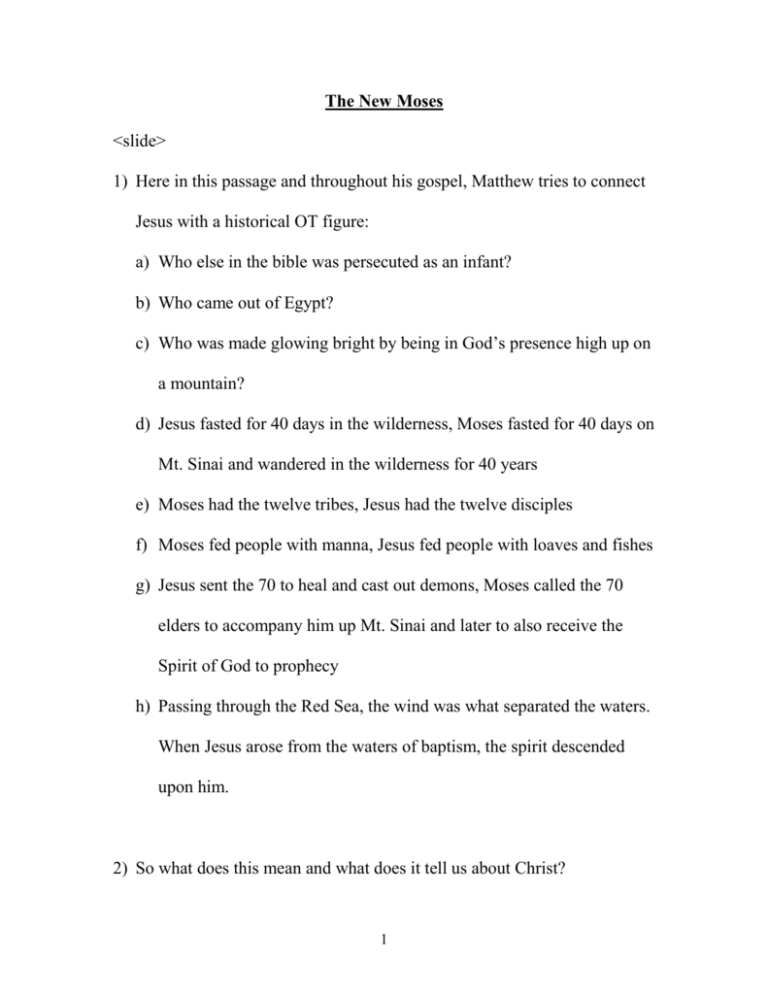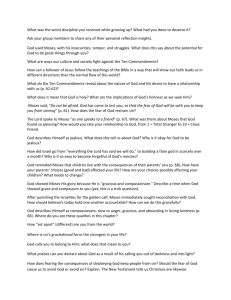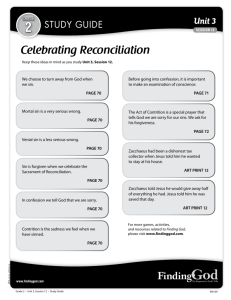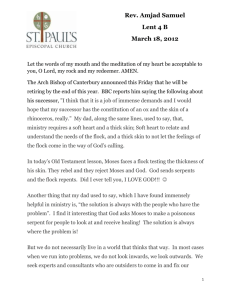The New Moses 1) Here in this passage and throughout his
advertisement

The New Moses <slide> 1) Here in this passage and throughout his gospel, Matthew tries to connect Jesus with a historical OT figure: a) Who else in the bible was persecuted as an infant? b) Who came out of Egypt? c) Who was made glowing bright by being in God’s presence high up on a mountain? d) Jesus fasted for 40 days in the wilderness, Moses fasted for 40 days on Mt. Sinai and wandered in the wilderness for 40 years e) Moses had the twelve tribes, Jesus had the twelve disciples f) Moses fed people with manna, Jesus fed people with loaves and fishes g) Jesus sent the 70 to heal and cast out demons, Moses called the 70 elders to accompany him up Mt. Sinai and later to also receive the Spirit of God to prophecy h) Passing through the Red Sea, the wind was what separated the waters. When Jesus arose from the waters of baptism, the spirit descended upon him. 2) So what does this mean and what does it tell us about Christ? 1 a) Who was Moses to the Israelites? i) Moses was their judge. Moses, like Jesus, handed down and interpreted God’s covenant and God’s law for the people. ii) Moses was their leader. Moses, like Jesus, taught and showed them how to live and how to obey God and called and trained other leaders to follow after them. iii) Moses was their miracle man. Moses, like Jesus, showed them God’s power and God’s provision for his people. iv) Moses was their mediator –Because God was so transcendent, so high above, so other worldly, in order for God to communicate to people and especially in order for people to communicate with God, they had to go through Moses. Jesus is our mediator, but in the exact opposite way that Moses was. Moses bridged the huge gap between God and humanity by communicating between them. Jesus eliminated the gap entirely by bringing the divine directly to Earth. But what is Moses’ most important role for the Jewish people: Appropriately enough for MLK jr. weekend: v) Moses was their liberator <slide> – the most important holiday of the Jewish tradition is Passover, the celebration of the liberation from 2 Egypt. Moses led the people out of Egypt and out of the slavery to Pharaoh and he is celebrated, remembered and revered above all for liberating God’s people from slavery. Since Matthew sets up Jesus to be the New Moses, we can assume his most important role is also as liberator. But what does Jesus free us from? We live in a free country. We have rights protected by the bill of rights and the government. For the most part, we can say what we want, go where we want, vote how we want, and do what we want? What is left for Jesus to free us from? Now of course the answer is sin. Jesus frees us from our sin, but what does that mean? Often times the answer we hear to this question is that Jesus frees us from the penalty of our sin – Jesus’ saving death on the cross frees us from condemnation and frees us for entrance into heaven when we die, which is true. But when Moses freed the Israelites, they didn’t have to wait until they died to be free. Their freedom was immediate as soon as Pharaoh told them to go. The slavery to sin that Christ liberated us from is not just when we die but now when we are alive, whenever we turn our lives over to God. The 3 freedom from sin is not just from the penalty of it when we die, but from the bondage to it now as we live. Sin is a punishment in and of itself now, not just something God will punish us for later. When we sin, we feel shame and guilt. When we sin we feel despair and hopelessness. When we sin we feel inadequacy and hopelessness. When we sin we feel unlovable and so we push God away. The consequence of sin is the internal war (Paul calls it the war of the flesh against the spirit) that we have to fight whenever we do anything. Sin tempts our choices, it affects our decisions, it distorts our judgment, it haunts our past with shame, it clouds our future with fear and the more we struggle with sin, the tighter its grip becomes upon us. Sin is out there in culture and society and the world, but it’s also inside us in our shame and our fear. Christ the liberator, frees us from the power of sin. By Christ’s grace, we are freed to let go of our mistakes and leave them in the past. We can be assured that God will love us no matter what we have done, no matter we have left undone, no matter what has been done to us. By Christ’s providence, we are freed to let go of needing to control the future. We can be assured that whatever tomorrow brings, God will provide what we need and God will never abandon us. By Christ’s power, we are freed to withstand the temptations of society and culture. We can see what freedom 4 truly looks like – it looks like obedience. We can be assured that no matter how many times we fall, we can always get back up and no matter how many times we allow ourselves to be trapped by temptation, we will always be freed again. Christ, the liberator, frees us from our sin, not just in the future, but in the present. Brother and sisters, Moses was celebrated as Israel’s judge, leader, miracle man, and mediator, but most of all he was celebrated as their liberator. Christ has liberated us from slavery to sin, not only in the future when we die, but today as we face temptation, shame, and fear. Know that you are free from the penalty of sin in the future, but also know that you are free from slavery to sin in the present. Turn towards God, connect with God, and surrender to God and shed the chains of guilt, shame, fear, and despair. Let Christ liberate you and live as a free child of God. 5









